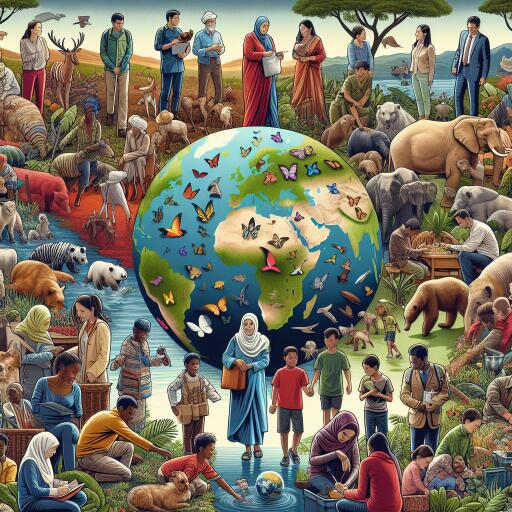
Global Cooperation: The Keystone of Wildlife Conservation
In the realm of wildlife conservation, global collaboration emerges as a linchpin in propelling strides forward in scientific inquiries, reintroducing species that have vanished, and cementing cultural ties among nations. This synergy is pivotal for fostering an enriched understanding and appreciation of our natural world, as echoed by experts during a pivotal gathering in the heart of Beijing.
The indispensable nature of wild animals stretches beyond their integral role in sustaining biodiversity and ecosystems; they bridge human connections across continents through their compelling stories of survival and adaptation. An advocate from a leading environmental agency underscored their significance, stating, “Wild fauna are not merely inhabitants of our planet but are conduits for cross-cultural diplomacy and friendship. The active exchange and collaborative efforts in wildlife studies enhance our collective knowledge, spur scientific discovery in conservation, and amplify the global narrative on the importance of protecting these beings.”
Reflecting on China’s journey since its pivotal policy shifts in the late 20th century, the country’s zoos have welcomed an array of exotic species from distant lands, such as koalas, jaguars, and polar bears, bringing the wonders of the wild closer to home. These introductions serve as a catalyst for international research collaborations, focusing on breeding programs and disease management, aimed at ensuring the survival of these species far from their native habitats.
The reestablishment of species that have faltered locally due to challenges like climate shifts and overhunting is another area where international cooperation shines. One significant achievement mentioned was the return of the Milu deer to China, a species that had vanished locally, through collaborative efforts with the United Kingdom, now boasting a thriving population thanks to concerted conservation strategies.
Moreover, the spirit of sharing knowledge stretches beyond borders, with China extending its expertise in species rehabilitation to nations such as Japan and South Korea, thereby reviving the presence of species like the crested ibis in regions where they had previously been declared extinct. Additionally, an initiative running over a decade has seen China bolster wildlife conservation skills among personnel in developing countries across Asia and Africa, showcasing a commitment to environmental stewardship on a global scale.
The advancements in wildlife research, particularly in the context of global cooperation, have been remarkable, as illustrated by the giant panda conservation efforts. Leveraging international expertise, China has surmounted significant hurdles in panda reproduction – from mating challenges to ensuring the survival of cubs. These breakthroughs have not only improved the living conditions of these iconic bears but also spotlighted China’s achievements in wildlife preservation on the world stage. Traveling to foreign lands, these majestic creatures have captivated hearts and highlighted the intrinsic value of international collaboration in conservation efforts.
The global reception of these conservation ambassadors emphasizes the profound impact of wildlife on fostering international relations and public awareness about conservation successes. Through these shared missions, nations are united in their commitment to preserving our planet’s invaluable biodiversity, underlining the essence of global cooperation in safeguarding the natural heritage for future generations.
As the narrative of wildlife conservation unfolds, it is evident that collaboration across borders is not just beneficial but essential. The shared journey of conservation is a testament to the power of unity in achieving monumental strides in protecting our planet’s diversity and ensuring that the wild’s wondrous tales continue to inspire and educate us all.DataTransfer>.





Leave a Reply